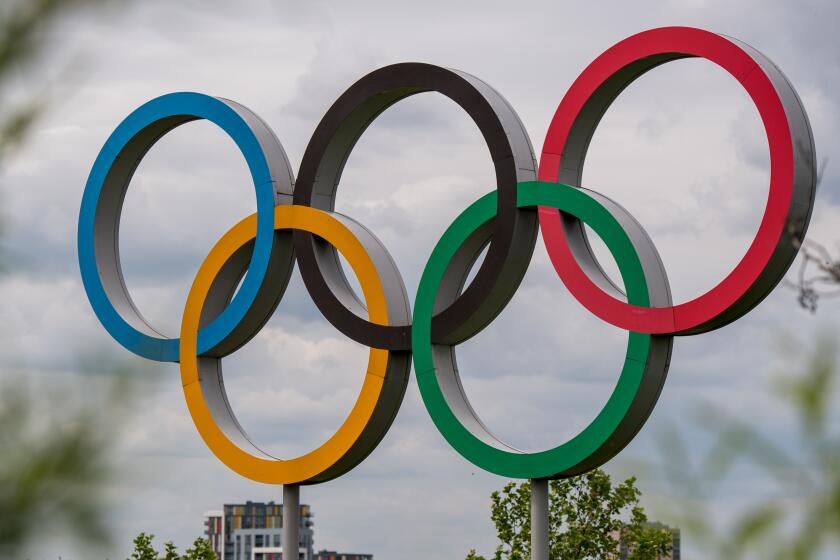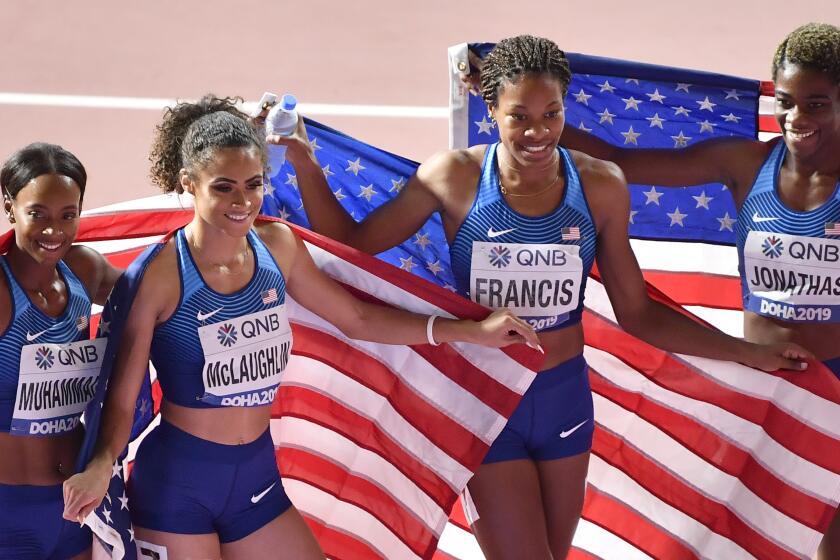IOC member deems Los Angeles ready to host the Olympic Games in 2028
- Share via
When Olympic leadership asked Nicole Hoevertsz to keep an eye on preparations for the 2028 Summer Games, she had reason to hesitate.
The unusual circumstances surrounding Los Angeles being selected as host has made for an abnormally extended buildup before competition begins.
“My reaction was, ‘Oh my God, that’s a long time, that’s nine years,’” she said. “What can happen in nine years, you know?”
As chairwoman of the International Olympic Committee’s coordination commission for 2028, Hoevertsz got a preliminary answer this week, making her first official visit to meet with local organizers and tour proposed venues, including the Coliseum, L.A. Live and Dignity Health Sports Park.
So far, so good.
“We see that the city is ready to host the Games in 2028 for sure,” she said. But added: “You cannot be complacent.”
The IOC chose L.A. as host in 2017 as part of a compromise between the two bid finalists, with Paris taking 2024 and L.A. organizers agreeing to go second.
Given that the LA 2028 plan is based on existing stadiums and arenas — the proposal includes Staples Center, Pauley Pavilion and the Rose Bowl — there aren’t any massive construction projects to be completed.
The U.S. Olympic and Paralympic Committee will allow athletes to promote themselves before and after the Games under a rule change.
Still, the IOC will continue to monitor the progress, with Hoevertsz acting as liaison with organizers. L.A. has special meaning for her.
A native of Aruba, she competed as a synchronized swimmer in the 1984 Summer Games held in Los Angeles. Returning to the Coliseum on Wednesday evoked memories marching out of the tunnel for the opening ceremony when she was an athlete.
“The whole stadium was packed with 100,000 people, it was the population of my entire island,” she recalled. “In fact, in 1984 we didn’t even have 100,000 people, we had 60,000.
“And I had the feeling, honestly, that each one of those people that were sitting there came out to see me.”
In the years following the Games, Hoevertsz worked her way up the in the Olympic movement, serving as a swimming federation official before becoming an IOC member in 2006.
Recently, she headed a three-person panel that handled the highly scrutinized task of determining which athletes from the banned nation of Russia would be allowed to compete under a neutral flag at the 2018 Winter Games in Pyeongchang, South Korea.
This assignment figures to be less problematic, but won’t be free of controversy.
The predicted cost of staging the 2028 Games has risen to $6.9 billion, roughly $700 million more than the original estimate, with organizers saying they had to adjust for inflation given the additional four years.
LA 2028 leaders expect the same economic forces will boost revenue. They have consistently maintained that they can cover all costs through corporate sponsorships, ticket sales, merchandising and other sources.
U.S. runners won the men’s and women’s 1,600-meter relays, and U.S. women finished first and second in the 100-meter hurdles. The U.S. finished with 14 gold medals — its best result at a world championships for 12 years.
A balanced budget would be crucial because city and state legislators have agreed to serve as a financial backstop, pledging taxpayer dollars to pay for any cost overruns.
Critics have noted that past Games, many of which involved substantial venue construction, have ended with massive deficits.
Those same critics have complained about the lack of a public referendum before the City Council approved the bid. IOC leaders suggested this year that future candidate cities might be required to hold a vote in advance.
After spending three days in meetings and touring the area, Hoevertsz insisted she had no concerns.
Saying that L.A. is in a “comfortable position,” she echoed the IOC suggestion that 2028 might serve a cost-saving model for future hosts.
“The biggest headache was always the construction of the venues,” Hoevertsz said. “Now you have this city that does not have to build any venues, they have everything. So they can actually focus on what other organizing committees usually have to do at the last minute … the actual organization of the Games.”
With her first visit ending Thursday, Hoevertsz said she plans to return next year with the rest of the commission for another inspection.
“Coming back to this city now as the chairperson of the coordination commission after 35 years?” the former Olympic athlete said. “That’s something very unique and something that, I think, maybe there is a little bit of destiny involved.”
More to Read
Go beyond the scoreboard
Get the latest on L.A.'s teams in the daily Sports Report newsletter.
You may occasionally receive promotional content from the Los Angeles Times.









